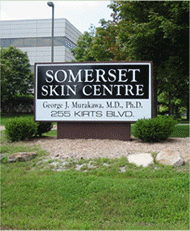
Somerset Skin Centre
255 Kirts Blvd, Suite 100
Troy, MI 48084
Phone: (248) 244-8448
Fax: (248) 244-8766
Monday - Friday 8:00 am - 5:00 pm. Evening appointments available
Saturday 8:00 am - 1:00 pm
Mohs appointments are available Monday through Friday and some Saturdays.
Contact Dermatitis
Contact Dermatitis / Patch Testing Eczema
Eczema (from the Greek, to boil over) is a group of skin diseases with one major common theme: an itchy rash. Eczema can be caused by a number of factors, including childhood eczema (atopic dermatitis), skin dryness (xerotic eczema), poor circulation (stasis dermatitis), external agents (irritant and allergic contact dermatitis), and medications. Another cause of itching can be from kidney failure and dialysis. Often times, eczema can be easily treated using a combination of topical steroids (anti-inflammatory agents), topical immunomodulators (Protopic, Elidel; anti-inflammatory agents), moisturizers, oral antihistamines (to treat itching), and cool showers. More severe disease can be treated with intramuscular or oral steroids, phototherapy, and other systemic agents. At Somerset Skin Centre, we treat the whole range of severity using the most up-to-date therapy. Although most moisturizers help, Nouriva (Ferndale Laboratories) is one of the most efficacious lotions. This cream provides a combination of the 3 essential groups of fats that are found in the skin, helping the skin heal much faster. Patients with severe itching and eczema respond excellently to phototherapy; narrow band UVB provides the best relief. We have extensive hours to accommodate patients and their schedules for light treatments.
Patch Testing
For patients with chronic eczema or those who do not respond well to therapy, patch testing may be indicated. This diagnostic test provides information regarding possible sources of an allergic or irritant contact dermatitis. For this diagnostic test, large pieces of medical tape with chemicals applied to small disks are placed on the back of unaffected skin. The patches remain on the person for 2 days (48 hours) and removed. Sensitivities to the chemical agents are identified at that time, and patients are asked to return in 1-3 days for a 2nd reading. Showers and baths are not permitted during the patch test, but patients are allowed to sponge bathe. At that time, literature is provided to the patient regarding his/her sensitivities, and the patient is instructed to avoid these chemicals. Patients follow up in 2 weeks to further discuss results and additional treatment options. Patch testing is different from allergy testing. Allergy testing allows the physician to identify causes of allergies, including foods, dust, mites, grass, etc. Patch testing, on the other hand, helps identify causes of rashes. For example, hair dressers are often sensitive to paraphenylenediamine, a substance used in hair dyes; atopic dermatitis patients are typically sensitive to nickel. Most dermatologists use the pre-packaged 24 panel Alloderm True Test patch test kits, primarily because of its convenience. However, we have found that we are only able to detect a subset of relevant allergens using the True Test. Thus, at Somerset Skin Centre, we perform a 68 panel patch test that is used and approved by the North American Contact Dermatitis Group. In addition to standard allergens, we test for steroid sensitivities, preservatives, rubber products, metals, and clothing dyes. We patch test for the following:
Did you know?
Dr. Murakawa serves as a reviewer for several national and international dermatology journals and is on the Editorial Board of the Journal of the American Academy of Dermatology.
Dr. Murakawa is certified by the following:
![]() American
Board of Dermatology
American
Board of Dermatology
![]() American
Society for Mohs Surgery
American
Society for Mohs Surgery
![]() Michigan
Board of Medical License.
Michigan
Board of Medical License.


